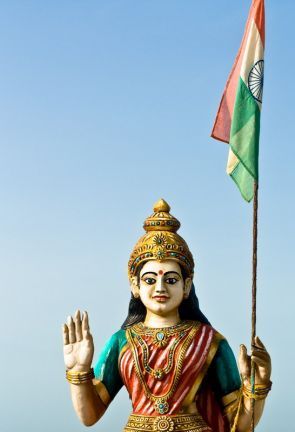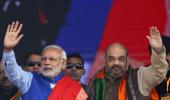
'Genuine secularism cannot be built on the backs of Hindus alone.'
'In a pluralistic society every religion is duty bound to respect the rights and sentiments of the others.'
'Vande Mataram was a casualty of minorityism. Bharat Mata Ki Jai cannot be allowed to go the same way,' argues Vivek Gumaste.
At the outset the vociferous and self-righteous indignation expressed by the left liberal lobby vis-a-vis the ostensibly jingoistic Bharat Mata Ki Jai controversy (kept simmering by recent happenings like Baba Ramdev's emotional outburst and anti-India slogans at NIT, Srinagar) seems to contain an element of truth and rationality; a much needed restraint to a rabid nationalism gone amok.
But pause for a moment, rewind the tape and re-run it in slow motion to comprehend the full details of the imbroglio and another perspective emerges: A picture that conclusively demolishes the unsavory image of an ugly aggressive and near fascist nationalism in ascendancy that is being projected to malign the current government.
First, let us analyse the genesis of this cantankerous debate. As a patriotic (not jingoistic) Indian, how do you respond when some fellow citizens threaten the destruction of your country with vituperative slogans like this:
Bharat Tere Tukde Honge.
Bharat ki barbadi tak Kashmir ki azadi tak jung karenge jung karenge.
Do you maintain a studied silence, tuck your tail under your rump and slink away like a coward? Or do you condone this vitriol under the pretence of freedom of speech?
The answer is neither. Nationalists have responded in the best possible way: by countering these noxious calls with a cry that celebrates Indian nationhood: Bharat Mata Ki Jai.
So let us be clear: The current controversy did not erupt in a vacuum; it is not a de novo phenomenon or a manufactured brouhaha engineered by nationalists to demean a community. It is and was a controversy deliberately thrust upon the government and nationalists.
And the controversy is being perpetuated by continued provocation: Inflammatory statements by Muslim leaders like Asaduddin Owaisi, fatwas by fanatic religious clerics and the happenings at NIT Srinagar where India's defeat in the T20 semi-final was allegedly celebrated with incendiary anti-India slogans.
Unprovoked, raucous rants of triumphalism can be dubbed as jingoism not courageous rebuttals to florid in your face treason. This qualifies as acceptable nationalism.
Next, we need to parse the phrase Bharat Mata Ki Jai objectively for any pejorative content. 'Bharat' is the traditional name of India, 'Mata' means mother and 'Jai' stands for victory.
There is nothing remotely religious about this invocation. Note there is no specific reference to any Hindu deity. Hindu scriptures do not allude to Bharat Mata and she is not worshipped in Hindu temples.
Strictly and accurately speaking, Bharat Mata is not a Hindu God, but an exalted personification of the motherland.
And unlike the controversy surrounding Vande Matram (which I feel is also unjustified) wherein the word 'Vande' may be open to misinterpretation as a godly pean, there is not even a sliver of ambiguity in this phrase. It does not contain any word akin to 'worship.'
Moreover, the word 'Jai' is acceptable to Muslims as they have indicated that they have no qualms about saying Jai Hind.
Collectively the phrase stands for 'Victory to Mother India' and as the above analysis indicates there is nothing religiously objectionable about it.
What appears to be the sticking point is the pictorial depiction of Bharat Mata as the Goddess Durga draped in a saffron sari astride a lion and carrying the Indian Tricolour. This, however, must be seen as a Hindu interpretation; an inherent Hindu attribute that confers godliness in every universal element: The sun, the moon, the air and the earth.
But Muslims need not subscribe to the Hindu interpretation of Bharat Mata as a goddess. They can bypass the Hindu interpretation and focus strictly on the textual denotation that simply means 'Victory to Mother India,' a secular phrase not in conflict with any religion.
To charge that nationalistic assertions represent 'the substitution of a new politics of intimidation in place of India's more organic politics of persuasion' (The Hindu, Editorial, March 19) is to miss the forest for the trees.
In fact, it is the other way around. By repeated refusal to chant the harmless slogan Bharat Mata Ki Jai, Muslims are not asserting their religious rights, but indulging in minorityism: A phenomenon unique to India wherein the minority holds the numerical majority hostage to get its way. This is precisely why the concept of majoritarianism is not applicable to India.
How Jana Gana Mana became our national anthem over Vande Mataram is a classic example of notorious minorityism. Both Mahatma Gandhi and Jawaharlal Nehru, indisputable secular icons, preferred Vande Matram.
In an article (Harijan, July 1, 1939) Gandhi wrote: 'No matter what its source was and how and when it was composed, it had become a most powerful battle cry among Hindus and Musalmans of Bengal during the partition days. As a lad, when I knew nothing of Ananda Math or even Bankim, its immortal author, Vande Mataram had gripped me, and when I first heard it sung it had enthralled me. I associated the purest national spirit with it. It never occurred to me that it was a Hindu song or meant only for Hindus.'
Nehru concurred with Gandhi. In a statement to the legislative committee of the Constituent Assembly (August 25, 1948) he said: 'It is unfortunate that some kind of argument has arisen as between Vande Mataram and Jana Gana Mana. Vande Mataram is obviously and indisputably the premier national song of India and intimately connected with our struggle for freedom. That position it is bound to retain and no other song can displace it.'
Yet they chose to negate their own convictions and thrust aside the majority opinion to anoint Jana Gana Mana as the national anthem in deference to Muslim sentiments.
Genuine secularism cannot be built on the backs of Hindus alone. In a pluralistic society every religion, big or small is duty bound to respect the rights and sentiments of the others. Vande Mataram was a casualty of minorityism. Bharat Mata ki Jai cannot be allowed to go the same way.











 © 2025
© 2025